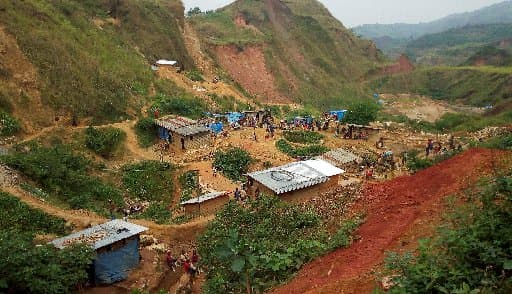WASHINGTON, D.C. — The current state of child labor and human rights violations in Congo’s mining sector “is particularly critical,” a Jesuit priest told a recent House hearing looking into accusations China is exploiting children in Africa in the mining of cobalt, lithium and various rare earth minerals.
Congo produces over 70% of the world’s cobalt, which along with other minerals, is used in components for smartphones, digital cameras, computer hard disks, flat-screen televisions, computer monitors and other high-tech devices.
Jesuit Father Rigobert Minani Bihuzo, regional coordinator of the Ecclesial Network of the Congo Basin Forest, was one of several witnesses at a July 15 hearing of the Tom Lantos Human Rights Commission of the U.S. Congress.
The priest also heads the research department of the Jesuit Center for Study and Social Action and helped publish a new report on child labor and human rights violations in Congo’s mining sector.
“The number of artisanal and small-scale mining sites from the Ituri region to Lake Tanganyika is estimated to be 1,000 and the number of artisanal miners to be 200,000 people, among them thousands of children and pregnant women,” Minani Bihuzo said.
“On the backs of trafficked workers and child laborers, China exploits the vast cobalt resources of the DCR (Congo) to fuel its economy and global agenda,” said Rep. Chris Smith, N.J., who ran the hearing as the commission’s co-chair.
“The Chinese Communist Party’s quest for cobalt for batteries and lithium for solar panels to power the so-called green economy motivates human rapacity as an estimated 40,000 children in Congo toil in nonregulated artisanal mines under hazardous conditions,” said Smith, who also is the ranking member of the House Foreign Affairs Subcommittee on Africa.
According to a Sept. 28, 2021, Bloomberg story, Congo government officials and the Chinese Communist Party in 2008 signed a contract under which China promised it would invest $3.2 billion in a copper-cobalt mine and provide another $3 billion worth of infrastructure projects, “all paid for by mining revenue.”
The contract has been renegotiated several times over the years.
“More than a decade later, less than a third of the infrastructure funding has been disbursed, and the mining project, known as Sicomines, has only received about three-quarters of the promised investment, according to the government,” Bloomberg reported.
In his testimony, Minani Bihuzo highlighted the findings of field research conducted jointly by the Episcopal Commission for Natural Resources and the two institutions with which he is associated.
The studies focused on working conditions in artisanal mining, as opposed to industrial mining, as seen “through the lens of human rights norms.” Artisanal mining “provides income to the highest number of workers in the mining business,” he said.
“All field survey reports deplored the fact that the majority of mines use children in various tasks. This is done while Congolese legislation and international standards prohibit child labor,” he said, adding that boys and girls “who initially come to the mines to obtain money for their schooling, end up dropping out of school.”
“Most of them stay permanently in the mines,” Minani Bihuzo testified.
“The majority of artisanal mining work is done in forests and other inaccessible places,” he said. “Travel conditions between the nearest towns and these mines are dangerous. Many children who want to work in the mines lose their lives even before arriving at the mining sites.”
These miners “are not provided with any protective equipment … they work seven days a week and more than 12 hours a day,” he said. “In reality, their working hours are not defined. … They are exposed to radiation from the products they use and to the danger of the explosives they use.”
The priest opened his testimony by stating that the Catholic Church’s social doctrine “condemns all forms of exploitation of children” and “insists on the right of a child to live and grow in an environment conducive to (his or her) full development.”
The church also recognizes “the right of every human being to work and be able to support oneself and one’s dependents,” he said. “It promotes the duty of everybody to make wise use of the earth’s natural and mineral resources.”
Also testifying was Hervé Diakiese Kyungu, a prominent Congolese civil rights attorney who previously represented child soldier victims before the International Criminal Court.
Diakiese confirmed the use of child labor in these mines and noted China’s “new way of colonization” uses “some very ugly old ways to enforce control.”
In southern Congo, on a site managed by the Chinese-owned Commus company, he said, “two persons identified as Chinese citizen(s) … instructed two Congolese military officers to whip two Congolese who were found on their site.”
Smith said the artisanal mines “are often no more than narrow shafts dug into the ground, which is why children are recruited — and in many cases forced — to descend into them, using only their hands or rudimentary tools without any protective equipment, to extract cobalt and other minerals.”
“Yet at this critical time, as China and Russia spread their malign influence, the United States’ presence is strangely muted in the region,” said Smith.
Also testifying was Eric Shultz, former U.S. ambassador to Zambia, who noted that “China uses the same approach in every African country: fueling authoritarianism, corruption, and economic inefficiency.”
“We are in a very real sense at war with China in Africa — and Russia too for that matter. Or rather they are at war with us,” Shultz said. “And Africa is too important, I believe, for the U.S. to not fight back.”
In any such fight, the U.S. does retain leverage, said Sasha Lehznev from Sentry, an investigative and policy team. “The reality is that U.S. automotive and electronic companies still have significant leverage on the supply chain.”













